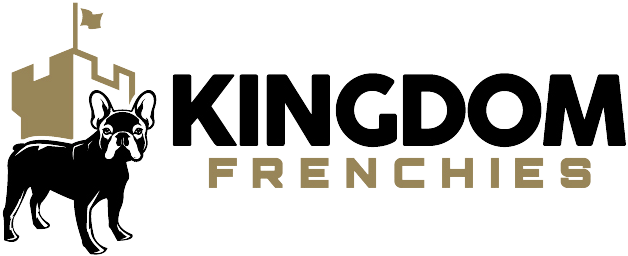French Bulldog Growth Chart, Development Stages & Timeline (What To Expect)
If you’re the proud owners of a French Bulldog, you know how important it is to keep track of your furbaby’s growth stages. These adorable pups grow up fast, and having information and knowledge about what to expect can help you ensure they stay happy and healthy.
In this guide, we’ll walk you through the key growth stages of French Bulldogs, from tiny newborns to full-grown adults. We’ll also share a handy charts and offer tips on how to support your pup’s development every step of the way. Ready to embark on this puptastic journey? Let’s dive in!
French Bulldog Growth Stages
Newborn to 8 Weeks
During the first eight weeks, your tiny Frenchie is going through some incredible changes! 🍼 Newborn French Bulldogs are completely dependent on their mother. Their eyes and ears are closed, and they spend most of their time sleeping and nursing.
Birth to 2 Weeks: Your newborn Frenchie is toothless, deaf, and blind. However, their sense of taste and touch are already developed. They will double their birth weight each week, starting from about 0.5 lbs.
2 to 4 Weeks: This is the transitional stage. Your pup’s eyes and ears will begin to open, and they’ll start to develop basic motor skills like crawling and standing. They will also begin to wag their tails and even bark. It’s an adorable sight! 🐶
4 to 8 Weeks: Socialization begins! Your Frenchie will start interacting more with their littermates and exploring their surroundings. This is also when they transition from their mother’s milk to solid food. Ensure you’re providing them with a high-quality puppy formula to support their rapid growth.
8 Weeks to 3 Months
At this stage, your Frenchie pup is ready to move into their forever home. They will be full of energy, exploring everything with their curious little noses.
Transition to New Home: This is an exciting time for both you and your pup. They will start to form a strong bond with you, so it’s important to establish a routine.
Introduction to Solid Food: Your Frenchie will now be eating solid puppy food. Make sure it’s rich in nutrients to support their growth.
Rapid Growth and Development: Expect significant growth in both height and weight. Regular vet check-ups will ensure they’re developing properly.
3 to 6 Months
The teething phase begins! Your Frenchie will continue to grow and develop, and this is a critical time for training and socialization.
Teething Phase: Your pup will lose their baby teeth and start getting their adult teeth. They’ll need plenty of chew toys to soothe their gums.
Continued Socialization and Training: Introduce your pup to new experiences, people, and other animals. Basic training commands will help them with adopting obedience and becoming well-behaved adults.
Steady Growth: Regular feeding of high-quality food and consistent vet visits are essential. 🏥
6 to 12 Months
Welcome to adolescence! Your Frenchie’s growth will start to slow down, but they will continue to gain muscle and mature sexually.
Adolescence: Your pup may test boundaries, so consistent training is key. This is also the time when they reach sexual maturity.
Growth Slows Down: While they might not get much taller, they’ll continue to fill out and gain muscle. Keep an eye on their weight to prevent obesity.
Behavioral Changes: Expect some changes in behavior and personality. Patience and positive reinforcement will help manage any teenage rebellion.
1 to 2 Years
Your Frenchie is transitioning into adulthood. Their growth stabilizes, and they reach their full size and weight.
Adulthood Transition: By 12 to 14 months of age, your Frenchie will be close to their adult size, though some may continue to fill out until two years old.
Stable Weight and Height: Maintain a balanced diet and regular exercise to keep them healthy and fit.
Final Development: Muscle development and final body structure are complete. 🏋️♂️
2 Years and Beyond
Congratulations, your Frenchie is now fully grown! Maintaining their health and happiness is your main goal.
Fully Grown and Mature: Your puppy may have reached their full physical maturity. Regular vet check-ups and a healthy lifestyle are crucial.
Health Maintenance: Focus on preventing obesity and monitoring for any breed-specific health issues.
Mental and Physical Stimulation: Keep them engaged with playtime, training, and social activities. A happy Frenchie is a healthy Frenchie!
For our paw-parents in America, according to the guidelines of the American Kennel Club, a healthy adult Frenchie should weigh no more than 28 pounds and stand about 11 to 13 inches tall from shoulder to paw.
French Bulldog Weight Chart
Keeping track of your French Bulldog’s growth is crucial for ensuring they develop healthily. Here’s a handy chart that provides an average weight and height for Frenchies at various stages of their early life. Remember, these are averages; individual male and female puppy growth may vary.
Male French Bulldog Growth Chart
| Age (Months) | Height (Inches) | Weight (Pounds) | Weight (Kilograms) |
|---|---|---|---|
| 3 Months | 5 – 6 | 6.8 – 9.0 | 3.1 – 4.1 |
| 6 Months | 7 – 9 | 17 – 22 | 7.7 – 10.0 |
| 9 Months | 10 – 11 | 20 – 25 | 9.1 – 11.3 |
| 12 Months | 11 – 13 | 22 – 28 | 10.0 – 12.7 |
Female French Bulldog Growth Chart
| Age (Months) | Height (Inches) | Weight (Pounds) | Weight (Kilograms) |
|---|---|---|---|
| 3 Months | 5 – 6 | 5.5 – 8.5 | 2.5 – 3.9 |
| 6 Months | 7 – 9 | 15 – 20 | 6.8 – 9.1 |
| 9 Months | 10 – 11 | 17 – 22 | 7.7 – 10.0 |
| 12 Months | 11 – 13 | 18 – 24 | 8.2 – 10.9 |
Signs of Healthy Growth
To ensure your Frenchie is growing healthily, look for:
- Steady Weight Gain: Your pup should gain weight consistently according to the chart.
- Active Behavior: A playful and energetic French Bulldog is usually a healthy one.
- Proper Nutrition: Make sure your pup is eating a balanced diet tailored to their needs. High-quality puppy food is essential during these stages.
Addressing Growth Concerns
If your puppy seems to be off the growth chart significantly, it might be time to consult your vet. Common issues include:
- Underweight: Could indicate nutritional deficiencies or health issues.
- Overweight: Can lead to obesity-related problems like joint issues and breathing difficulties.
When to Consult a Veterinarian
Regular vet visits will help you keep tabs on your Frenchie’s growth. If you notice any sudden changes or if your pup isn’t hitting the expected milestones, a vet can provide guidance and support. 🏥
Tips for Promoting Healthy Growth
- Balanced Diet: Ensure they get all the necessary nutrients.
- Regular Exercise: Keep them active but not over-exercised.
- Consistent Check-ups: Regular vet visits (and potentially blood tests) to monitor their development.
Monitoring your French Bulldog’s growth is a crucial part of ensuring they grow up happy and healthy. Use this chart as a guide, but always consider your pup’s unique needs and characteristics.

Factors Affecting French Bulldog Growth
Just like any other breed, various factors impact French Bulldog growth. To ensure your pet develops correctly, it’s essential to understand these different variables. The following factors can impact your French Bulldog’s growth:
| Factors | Impact on Growth |
| Genetics | Determine size, bone density, and muscle composition. |
| Nutrition | A proper diet provides necessary vitamins and minerals for healthy growth. |
| Exercise | Regular exercise promotes muscle growth, coordination, and mobility, influencing overall development. |
| Overall Health | Illness or injury can delay the growth process and cause permanent complications if not appropriately addressed. |
Genetics, in particular, play a significant role in French Bulldog growth. It’s crucial to select a breeder that prioritizes healthy genetics to avoid health concerns and ensure proper growth.
In addition, providing a balanced diet, regular exercise, and proper medical care can significantly impact your French Bulldog’s growth. By understanding these factors, you can help your furry friend grow up healthy and happy.
Nutrition and Exercise for Growth
Dietary Needs
Feeding your Frenchie a balanced diet is key to their healthy growth. During their early stages, their nutritional needs are high. Providing the right food will set the foundation for a healthy life. 🍗🥕
Puppy Stage: High-quality puppy food rich in proteins and essential nutrients is crucial. Aim for foods specifically formulated for small breeds. This ensures they get the right amount of calories and nutrients needed for their rapid growth.
Transition to Adult Food: Around 12 months, start transitioning to adult dog food. This change should be gradual to avoid digestive issues. Adult food has balanced nutrients tailored to maintain their health without promoting excessive weight gain.
Special Considerations: Always check the ingredients list. Avoid foods with fillers like corn, wheat, and soy. Look for real meat as the first ingredient. Healthy fats, like those from fish oil, are also beneficial for their skin and coat.
Exercise Requirements
Exercise is vital for your Frenchie’s overall health. But remember, these little pups have special needs. Over-exercising can be just as harmful as not exercising enough.
Puppy Playtime: Young Frenchies are full of energy! Short, frequent play sessions are ideal, preferably with their pet siblings. Activities like gentle fetch or interactive toys can keep them entertained and help with learning of their motor skills.
Adolescence Activities: As your Frenchie grows, their exercise needs will increase. Aim for about 30 minutes to an hour of exercise daily. Walks in nature, short runs, and play sessions are great. However, avoid strenuous activities that can stress their developing joints.
Adult Frenchies: Maintain a routine that includes daily walks and playtime. Be mindful of their brachycephalic (short-nosed) structure, which can make them prone to overheating. Always ensure they have access to water and avoid exercise in extreme heat.
Mental Stimulation: Don’t forget about mental exercise! Puzzle toys, training sessions, and social interactions are perfect for keeping their minds sharp.
Cautions
Avoid Overfeeding: French Bulldogs are prone to obesity, just like humans. Measure their food portions and avoid giving too many treats. An overweight Frenchie can suffer from various health issues, including cherry eye, joint problems and respiratory difficulties.
Watch the Weather: Due to their short noses, Frenchies can struggle in hot weather. Exercise them during cooler parts of the day and always provide plenty of water.
Regular Check-ups: Frequent vet visits will help you tailor their diet and exercise routine to their specific needs. 🏥
Proper nutrition and regular exercise are the cornerstones of a healthy Frenchie. By following these guidelines, you’ll help your pup grow into a strong, happy, and healthy adult.
Conclusion
Taking care of your French Bulldog through their various growth stages can be a joyful and rewarding experience. From the tiny, wobbly puppy stage to the full-grown, majestic adult, each phase is filled with unique moments and milestones.
We hope our comprehensive guide helped you understand Frenchie growth patterns, dietary needs, and health considerations.
If you ever have any concerns or questions about your pup’s growth, don’t hesitate to consult your vet. Vets are there to help pet parents families every step of the way. Enjoy every moment with your adorable furbaby – they grow up so fast!
Frequently Asked Questions About French Bulldog Growth and Development
At what age are French Bulldogs fully grown?
French Bulldog puppies typically reach their full weight and height by 12 to 14 months. However, they might continue to gain muscle and fill out until they are around two years old. This means your Frenchie puppy will be close to its adult size by the first year but might still undergo some changes as they mature.
How big is a 3-month-old French Bulldog?
At three months old, a French Bulldog typically stands between 5 to 6 inches tall and weighs between 6.8 to 9.0 pounds (3.1 to 4.1 kg). This is a crucial growth phase, so ensure your pup gets a balanced diet and regular vet check-ups to monitor their development.
How big do French Bulldogs get in kg?
Adult French Bulldogs usually weigh between 9 to 13 kg (20 to 28 pounds). The size can vary depending on genetics, diet, and overall health. Male Frenchies tend to be on the heavier side compared to females.
Will my Frenchie’s head get bigger?
Yes, a French Bulldog’s head will continue to grow and develop until they are about two years old. French Bulldogs have a distinctive head shape that can appear larger compared to their bodies, and it will reach its full size as they fully mature.
Is a 1-year-old Frenchie still a puppy?
At one year old, a Frenchie is transitioning from puppyhood to adulthood. They are still young and energetic but are considered adolescents. By this age, most French Bulldogs have reached their adult height and are close to their full weight, but they may continue to fill out and mature for several more months.
What age do french bulldogs head “split”?
The term “head split” in French Bulldogs refers to the natural development of their skull structure as they mature. This occurs typically between 7-10 months when the skull bones develop a more pronounced center line or “split” down the middle of their head.
This isn’t an actual splitting but rather normal growth of the distinctive French Bulldog head shape. No special care is needed, though regular check-ups ensure proper development.
How can I tell how big my frenchie will get?
To predict your Frenchie’s adult size, check their growth at 4 months (about 50% of adult weight) and 6 months (75%). Consider parents’ size, as genetics play a key role. Refer to standard growth charts – adult males typically reach 22-28 pounds, females 18-24 pounds. Paw size can offer clues, with larger paws suggesting a bigger adult size.
Sources:
Pawlicy Advisor: French Bulldog Growth & Weight Chart
PurelyPets: When does a French Bulldog stop growing?

